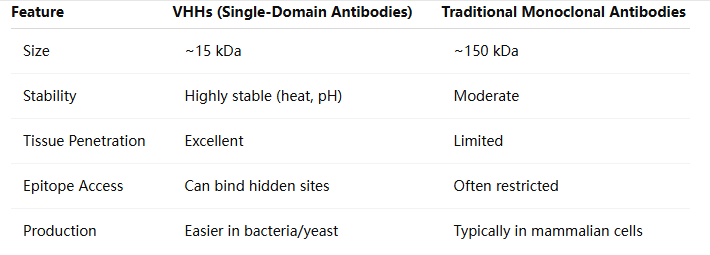What Are Single-Domain Antibodies (VHHs) and Why They Matter in Modern Biotech
In recent years, single-domain antibodies (also known as VHHs or nanobodies) have rapidly emerged as one of the most promising tools in modern biotechnology. Originally discovered in camels and llamas, these tiny yet powerful molecules are making waves in diagnostics, therapeutics, and even next-gen research platforms.
What Are VHH Antibodies?
Single-domain antibodies are the smallest functional fragments of antibodies. Unlike traditional antibodies (which have heavy and light chains), VHHs consist of only the variable domain of the heavy chain. This compact structure gives them unique properties like high stability, strong tissue penetration, and the ability to bind hidden or concave epitopes that full-size antibodies often can't reach.
How Do VHHs Compare to Traditional Antibodies?

These characteristics make VHHs ideal for drug development, imaging, and biosensor platforms.
Why Are VHHs a Big Deal in Biotech?
Biotech and pharmaceutical companies are increasingly leveraging VHHs for several reasons:
Drug Development: VHHs can be humanized and engineered into bispecifics, CAR-T therapies, or ADCs (antibody-drug conjugates).
Diagnostics: Their high affinity and stability make them excellent for ELISA kits, imaging agents, or lateral flow tests.
Research Tools: VHHs can be used as intrabodies (inside cells) to modulate or visualize protein interactions.
Conclusion
Single-domain antibodies are no longer niche tools; they are reshaping the future of biomedical science. With easier production, better tissue access, and increasing commercial use, VHHs are poised to play a foundational role across biotech R&D and therapeutic development. Whether you're a scientist, student, or biotech professional, keeping an eye on VHH technology is no longer optional—it's essential.